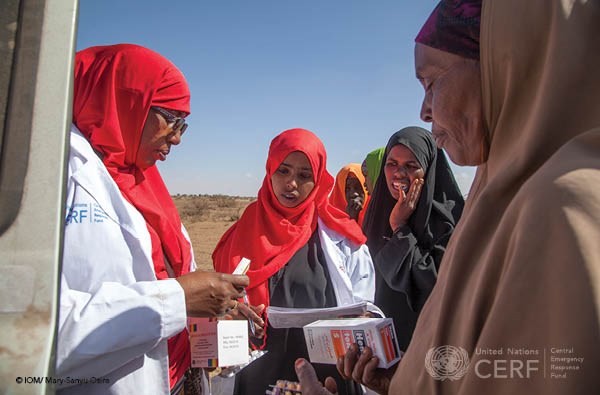
Saturday April 22, 2017

Young Halima has trekked for four days and nights in search of water. “We have named this drought Odi Kawayn, which is Somali for “something bigger than the elders,” she said. “None of our elders has ever seen a drought as severe as this one.”
Some 6.2 million people — half of Somalia’s population — need aid to survive, and 2.9 million of these people do not know where their next meal will come from. Somalia has always been prone to drought, but some parts of the country have not received rain for three consecutive years.
If aid does not scale up quickly, people fear a repeat of the famine that killed nearly 260,000 people in 2011. There are differences of concern between the current crisis in Somalia and the 2011 famine. An estimated 530,000 people have been displaced by drought since November 2016, as compared with 100,000 people displaced in 2011 at the famine’s peak.
The current rate of cholera is also much higher than in 2011. However, humanitarians have been much quicker to respond to early warning signs this time around, raising the alarm in early 2016 at the first signs of stress among pastoralists and agropastoralists, and kick-starting early funding, including allocations from the Central Emergency Response Fund (CERF).
The looming famine in Somalia and countries including Nigeria, South Sudan and Yemen has prompted the UN Secretary-General and humanitarian agencies, including the United Nations Office for the Coordination of Humanitarian Affairs, to call on the international community to urgently commit US$4.4 billion so that Governments and humanitarian partners can immediately scale up their response.
Thanks to early contributions from Member States, CERF was able to release $18 million in January 2017 through its Underfunded Emergencies Window to respond to the first signs of severe drought in Puntland and Somaliland.
Humanitarian partners used the funding to provide urgent primary health care for more than 35,000 people. Mobile health teams from the International Organization for Migration travel to hard-to-reach locations in Puntland and Somaliland and deliver health services to drought-affected communities. On average, each mobile health team comprises one medical doctor, one clinical nurse, one midwife and one pharmacist, and treats 500 patients per week.
According to Dr. Nouradin, a health officer who works on a mobile health team in Somaliland, the most frequent diseases are respiratory tract infections and diarrhoea. Malnourished children are far more susceptible to these illnesses, and the combination is the biggest killer of children in the region. Poor sanitation and health systems have led to rapidly worsening health prospects for millions of people.
Many of the worst-affected people are pastoralists, whose livestock are their main source of survival. Losing their livestock leaves them financially crippled. Across the country, livestock are weak, supplying less milk and meat, and they are worth increasingly less when sold or traded for other food items, such as cereals.
CERF released a loan of $22 million to enable the UN Food and Agriculture Organization (FAO) to provide cash relief to people who have lost their income due to crop and livestock failure and to allow them to buy food. The funds will also save livestock and related food, as well as protect income, by providing animals with minerals, additional water and fodder. The loan will bridge a crucial gap and allow FAO to immediately save the lives and the livelihoods of farmers and herders until additional funds are received.
But many more people worldwide are at risk of famine, and much more is needed to prevent a humanitarian catastrophe. The Emergency Relief Coordinator (ERC) has set aside an additional $15 million in CERF rapid-response funds for Somalia to respond to the severe food insecurity situation.
CERF is mandated to deliver funding when humanitarian crises rapidly deteriorate or to enable fast scale-up and delivery. Given the already competing demands on CERF’s limited funds for early response, the swift payment of pledges and additional, new commitments are critical.
“CERF is one of the fastest ways to enable urgent response to people most in need,” said ERC Stephen O’Brien, as he released the loan to support early action in Somalia. “I call on the international community to immediately increase support to humanitarian operations, and CERF in particular, so that together we can save more lives before it’s too late.”